 Now that they've made it as difficult as possible for those pesky 90-year-old nuns to cast votes, it's time to make sure that vets injured and disabled in Iraq and Afghanistan have as difficult a time voting as possible.
Now that they've made it as difficult as possible for those pesky 90-year-old nuns to cast votes, it's time to make sure that vets injured and disabled in Iraq and Afghanistan have as difficult a time voting as possible.
The Republican War on Voting, as directed by Commander-in-Chief George W. Bush out of the White House, continues to continue.
The new front: Disallowing registration drives, by non-partisan organizations at Veterans Administration facilities. That, despite an order issued in late April by the Department of Veterans Affairs that they would allow such activity, in compliance with the National Voter Registration Act of 1993.
Apparently someone high up (we don't yet know who) found out about that, and ordered an about-face on the previous directive, leading the Veterans Health Administration's Under Secretary for Health, Michael J. Kussman, to announce this week that "Voter registration drives are not permitted" at their facilities, "due to Hatch Act requirements and to avoid disruptions to facility operations."
"The Department of Veterans Affairs has retreated on a recently announced policy to allow voter registration drives at its facilities where veterans' groups and others would assist wounded former soldiers to participate in the 2008 presidential election," writes Steven Rosenfeld over at AlterNet, where he points out that "the Hatch Act restricts political activities by federal employees."
Non-partisan voter registration drives by groups such as the League of Woman Voters, however, can hardly be considered "political activities by federal employees."
Senators such as Feinstein and Kerry, and disabled veterans groups, as you may imagine, are none too happy...
Rosenfeld goes on to quote from a statement and letter issued yesterday by the Senators, demanding an explanation for the quickly changed policy, and wondering what "type of disruptions the VA envisions might occur during voter registration drives by...the League of Women Voters or veterans' organizations." (Their statement and letter are posted in full at the end of this article.)
As well, Rosenfeld offers comment from disabled vet groups who charge "block[ing] voter registration for our hospitalized veterans is shameful, outrageous, and despicable."
But since when has shamefulness ever gotten in the way of Republican Party policy to undermine American democracy or show out-and-out contempt for U.S. troops?
Paul Sullivan of Veterans for Common Sense added that his group "finds it unconscionable that VA would reverse position and prohibit voter registration efforts for our wounded, injured, ill, and disabled veterans in VA hospitals and nursing homes as more and more casualties flood home from the Iraq and Afghanistan wars."
An attorney who has been taking on the VA further points out that the Administration got caught allowing paid campaign workers from the Republican Party to register voters at their facilities while they disallowed nonpartisan groups from the same places.
"They've been forced to admit under oath that they told the League of Women Voters that if they took a position on Iraq, they'd lose their access. The court told them they can't do that anymore, so they are going to ban all voter registration drives," D.C. attorney Scott Rafferty tells Rosenfeld.
Yeah, it's that bad.
The complete statement from Feinstein and Kerry follows below [emphasis in original]...
- New VA Directive appears to include blanket prohibition on voter registration drives -
Washington, DC U.S. Senators Dianne Feinstein (D-Calif.) and John Kerry (D-Mass.) today expressed concern about a new directive by the Veterans Health Administration that appears to reverse an earlier proposal to provide greater voter registration access to veterans in the departments care.
- On April 25, the Department of Veterans Affairs issued a directive that required all VA facilities develop comprehensive voter registration plans to assist veterans in voting. It also required the VA to publicly post voter registration information for veteran facility inpatients and required that VA facilities provide absentee voter applications if patients cannot leave the facility.
- Earlier this week, the Department of Veterans Affairs withdrew that directive, and issued a new directive that introduces a broad prohibition against organizations conducting voter registration drives at VA facilities.
- In response, the senators wrote a letter to Veterans Affairs Secretary James B. Peake, saying the new policy could discourage involvement from nonpartisan groups such as veterans service organizations and the League of Women Voters in helping veterans to vote.
We believe that the earlier directive better addressed the need for a consistent voter registration policy for our veterans, the senators wrote to Secretary Peake. While the changes made in the new directive seem small, the impact is large. It appears to us that the Department took one step forward for our veterans and the right to vote by directing that assistance be provided with voter registration and with securing absentee ballots, but then took a large step back by prohibiting voter registration drives.
The Senators requested clarification about why the new directive was issued, who retracted the initial policy directive and whether Secretary Peake sees the change as a complete bar on external, nonpartisan voter registration drives.
Background
The VAs April 25 directive came in the wake of a letter exchange between Senators Feinstein and Kerry and Veterans Affairs Secretary James B. Peake over whether VA facilities should be designated as voter registration agencies within the definition of the National Voter Registration Act of 1993. The Act requires states to offer voter registration opportunities at all offices that provide public assistance, services to the disabled and at all motor vehicle offices.
Many veterans live at VA facilities and some, especially those who are disabled, find it difficult to travel off-campus for services including voter registration. However, a federal appeals court recently ruled that voter registration groups do not have the right to register veterans on the grounds of VA facilities.
In light of the court decision, Senators Feinstein and Kerry wrote a letter in March to Secretary Peake to find ways to ensure that all veterans have access to voter registration materials and identify the policies they have in place to support voter registration.
Following is the text of the letter by Senators Feinstein and Kerry:
May 6, 2008
The Honorable James B. Peake
Secretary
U.S. Department of Veterans Affairs
810 Vermont Avenue NW
Washington, DC 20420Dear Secretary Peake:
On April 25, 2008, the Department of Veterans Affairs responded to our request for a consistent voter registration policy by issuing Directive 2008-23.While we do not believe it went far enough, we commend the changes made by the Directive which provided that veterans would be required to receive voter information and assistance in registering and applying for an absentee ballot.We were pleased that you took action to ensure that our nations veterans can easily register to vote and apply for an absentee ballot.
However, in the few days following the issuance of the first directive, the Department apparently withdrew it.Without explaining the rationale for this change, the Department today released a new policy, Directive 2008-25.While the new directive retains many positive provisions found in the earlier directive, it appears that a new and broad prohibition was included against third-party organizations conducting voter registration drives, even with the approval of the Department of Veterans Affairs.This would have the impact of discouraging involvement from nonpartisan groups for civic support for veterans.
We request that some clarification be provided on why the new directive was issued, who specifically retracted the initial policy directive, and whether you consider this change a complete bar on external, nonpartisan voter registration drives.The new directive references Hatch Act requirements, but the Office of Special Counsel has made clear that federal employees, even those who are considered to be in sensitive positions, may assist in voter registration drives. It is also clear from numerous policy statements issued by the Office of Special Counsel that federal employees can participate in nonpartisan voter registration drives on federal property and on official time. Moreover, the veterans the VA should support are not subject to any restrictions under the Hatch Actbecause they are not federal employees.
Directive 2008-25 further states that the policy changes are designed to avoid disruptions to facility operations. We would appreciate knowing the type of disruptions the VA envisions might occur during voter registration drives by nonpartisan organizations, such as the League of Women Voters or veteransorganizations, and why any potential disruption could not be addressed by less restrictive means.
We believe that the earlier directive better addressed the need for a consistent voter registration policy for our veterans.While the changes made in the new directive seem small, the impact is large. It appears to us that the Department took one step forward for veterans and the right to vote by directing that assistance be provided with voter registration and with securing absentee ballots, but then took a large step back by prohibiting voter registration drives.
We hope to continue to work with your office to ensure that the VA has a strong and consistent policy to support voter registration for our veterans.
Sincerely,
U.S. Senator Dianne Feinstein
U.S. Senator John Kerry


 It's About Elections and the Windmills of His Mind: 'BradCast' 1/29/26
It's About Elections and the Windmills of His Mind: 'BradCast' 1/29/26 'Green News Report' 1/29/26
'Green News Report' 1/29/26
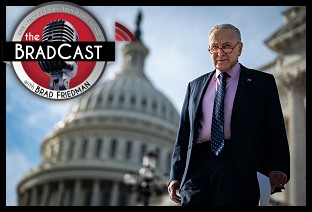 Govt Shutdown Over ICE Funding Near Certain This Weekend: 'BradCast' 1/28/26
Govt Shutdown Over ICE Funding Near Certain This Weekend: 'BradCast' 1/28/26 Trump Blinks, Bovino Out, MN Op Falters but Continues as Midterm Accountability Looms: 'BradCast' 1/27/26
Trump Blinks, Bovino Out, MN Op Falters but Continues as Midterm Accountability Looms: 'BradCast' 1/27/26 'Green News Report' 1/27/26
'Green News Report' 1/27/26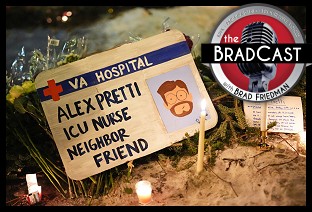 The ICE Murder of ICU Nurse Alex Pretti and the Heroes of Minneapolis: 'BradCast' 1/26/26
The ICE Murder of ICU Nurse Alex Pretti and the Heroes of Minneapolis: 'BradCast' 1/26/26  The BRAD BLOG: 22 Years and Still Counting
The BRAD BLOG: 22 Years and Still Counting Sunday 'Worth a Thousand Words' Toons
Sunday 'Worth a Thousand Words' Toons Mr. Smith Testifies (Publicly) in Washington: 'BradCast' 1/22/26
Mr. Smith Testifies (Publicly) in Washington: 'BradCast' 1/22/26 'Green News Report' 1/22/26
'Green News Report' 1/22/26 World Turning Against Self-Destructing U.S. Under Trump: 'BradCast' 1/21/26
World Turning Against Self-Destructing U.S. Under Trump: 'BradCast' 1/21/26 Trump Admin Waste, Fraud, Abuse on Voting, at DOJ, by DOGE: 'BradCast' 1/20/26
Trump Admin Waste, Fraud, Abuse on Voting, at DOJ, by DOGE: 'BradCast' 1/20/26 'Green News Report' 1/20/26
'Green News Report' 1/20/26 Sunday 'Domestic Terrorist' Toons
Sunday 'Domestic Terrorist' Toons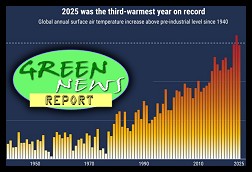 'Green News Report' 1/15/26
'Green News Report' 1/15/26 'A Cornered Rat': Trump Terrorizes Minneapolis, Menaces NATO, World: 'BradCast' 1/15/26
'A Cornered Rat': Trump Terrorizes Minneapolis, Menaces NATO, World: 'BradCast' 1/15/26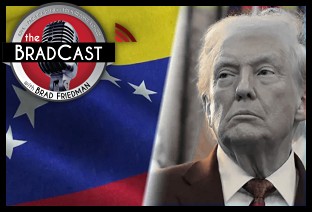 'Not Close to Over': Mad King Trump in Venezuela (& Beyond): 'BradCast' 1/14
'Not Close to Over': Mad King Trump in Venezuela (& Beyond): 'BradCast' 1/14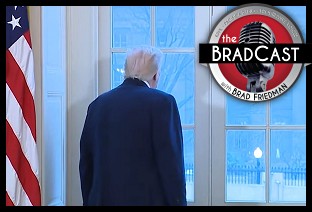 Things Getting Weirder as Trump Keeps Losing: 'BradCast' 1/13/26
Things Getting Weirder as Trump Keeps Losing: 'BradCast' 1/13/26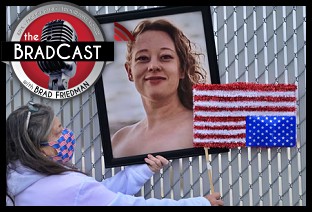 After ICE Murder in MN, Local Cops Disown Fed Policing Practices: 'BradCast' 1/12/26
After ICE Murder in MN, Local Cops Disown Fed Policing Practices: 'BradCast' 1/12/26 Trump to Congress, Climate, U.N., Rule of Law: DROP DEAD - 'BradCast' 1/8/26
Trump to Congress, Climate, U.N., Rule of Law: DROP DEAD - 'BradCast' 1/8/26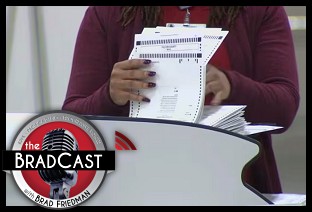 'Nonsense': Trumpers Claim 315k Fraudulent GA Votes in 2020: 'BradCast' 1/7/26
'Nonsense': Trumpers Claim 315k Fraudulent GA Votes in 2020: 'BradCast' 1/7/26 Jack Smith Testimony on Trump J6 Crimes, DOJ Weaponization: 'BradCast' 1/6/26
Jack Smith Testimony on Trump J6 Crimes, DOJ Weaponization: 'BradCast' 1/6/26 Trump War on Venez. is About Ego, Power, 'Alien Enemies Act': 'BradCast' 1/5/26
Trump War on Venez. is About Ego, Power, 'Alien Enemies Act': 'BradCast' 1/5/26
 VA GOP VOTER REG FRAUDSTER OFF HOOK
VA GOP VOTER REG FRAUDSTER OFF HOOK Criminal GOP Voter Registration Fraud Probe Expanding in VA
Criminal GOP Voter Registration Fraud Probe Expanding in VA DOJ PROBE SOUGHT AFTER VA ARREST
DOJ PROBE SOUGHT AFTER VA ARREST Arrest in VA: GOP Voter Reg Scandal Widens
Arrest in VA: GOP Voter Reg Scandal Widens ALL TOGETHER: ROVE, SPROUL, KOCHS, RNC
ALL TOGETHER: ROVE, SPROUL, KOCHS, RNC LATimes: RNC's 'Fired' Sproul Working for Repubs in 'as Many as 30 States'
LATimes: RNC's 'Fired' Sproul Working for Repubs in 'as Many as 30 States' 'Fired' Sproul Group 'Cloned', Still Working for Republicans in At Least 10 States
'Fired' Sproul Group 'Cloned', Still Working for Republicans in At Least 10 States FINALLY: FOX ON GOP REG FRAUD SCANDAL
FINALLY: FOX ON GOP REG FRAUD SCANDAL COLORADO FOLLOWS FLORIDA WITH GOP CRIMINAL INVESTIGATION
COLORADO FOLLOWS FLORIDA WITH GOP CRIMINAL INVESTIGATION CRIMINAL PROBE LAUNCHED INTO GOP VOTER REGISTRATION FRAUD SCANDAL IN FL
CRIMINAL PROBE LAUNCHED INTO GOP VOTER REGISTRATION FRAUD SCANDAL IN FL Brad Breaks PA Photo ID & GOP Registration Fraud Scandal News on Hartmann TV
Brad Breaks PA Photo ID & GOP Registration Fraud Scandal News on Hartmann TV  CAUGHT ON TAPE: COORDINATED NATIONWIDE GOP VOTER REG SCAM
CAUGHT ON TAPE: COORDINATED NATIONWIDE GOP VOTER REG SCAM CRIMINAL ELECTION FRAUD COMPLAINT FILED AGAINST GOP 'FRAUD' FIRM
CRIMINAL ELECTION FRAUD COMPLAINT FILED AGAINST GOP 'FRAUD' FIRM RICK SCOTT GETS ROLLED IN GOP REGISTRATION FRAUD SCANDAL
RICK SCOTT GETS ROLLED IN GOP REGISTRATION FRAUD SCANDAL VIDEO: Brad Breaks GOP Reg Fraud Scandal on Hartmann TV
VIDEO: Brad Breaks GOP Reg Fraud Scandal on Hartmann TV RNC FIRES NATIONAL VOTER REGISTRATION FIRM FOR FRAUD
RNC FIRES NATIONAL VOTER REGISTRATION FIRM FOR FRAUD EXCLUSIVE: Intvw w/ FL Official Who First Discovered GOP Reg Fraud
EXCLUSIVE: Intvw w/ FL Official Who First Discovered GOP Reg Fraud GOP REGISTRATION FRAUD FOUND IN FL
GOP REGISTRATION FRAUD FOUND IN FL

































